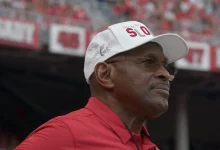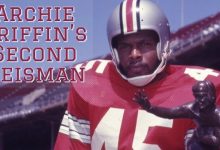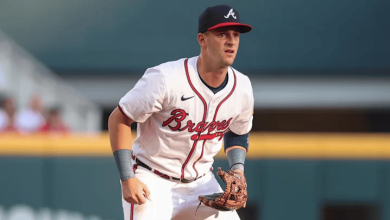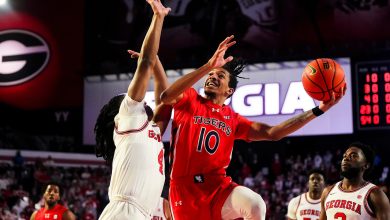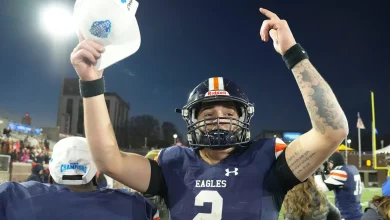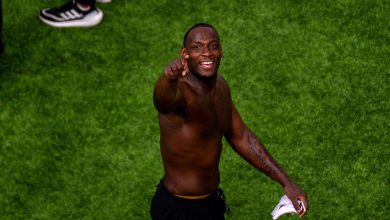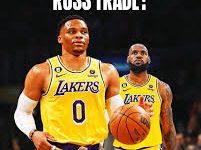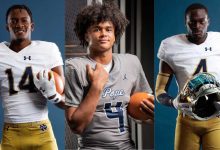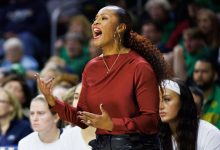President Donald Trump Mulling Executive Order to Regulate NIL, Report Says
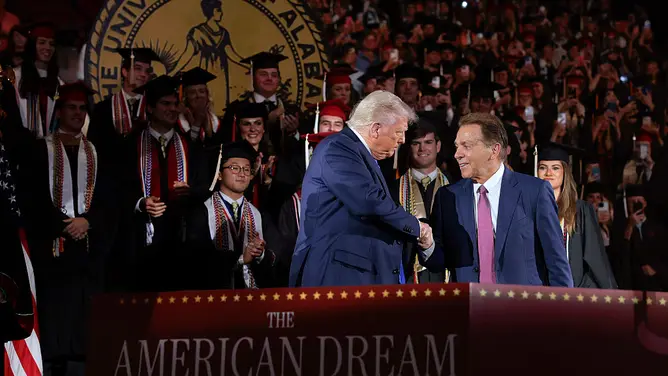
In a move that has the potential to shake the foundations of college athletics, President Donald Trump is reportedly considering an executive order aimed at regulating the burgeoning Name, Image, and Likeness (NIL) landscape in college sports. This potential action comes at a time when NIL deals, which allow college athletes to profit from their personal brand, have been growing rapidly, and their impact on the competitive balance in college athletics is becoming a topic of intense debate.
For years, NIL compensation has been a highly discussed and divisive topic within the sports community. With the NCAA’s decision to lift restrictions on athletes earning money from their name, image, and likeness in 2021, college sports have entered an entirely new era. While many see this as a monumental step forward for athlete empowerment and equity, others argue that it has created an uneven playing field, where wealthier schools and boosters can funnel large amounts of money to top recruits and current athletes. Now, with the possibility of Trump’s involvement, the debate over NIL regulations is intensifying, and the ramifications of such a decision could reverberate throughout college sports for years to come.
The Rise of NIL in College Sports
To understand the significance of President Trump’s potential executive order, it is necessary to first grasp the rise of NIL and its impact on the world of college athletics. Before 2021, college athletes were prohibited from profiting off their name, image, and likeness under NCAA rules. While athletes were given full scholarships to play sports at major universities, they were not allowed to accept payments for things like endorsements, social media posts, or autographs.
This changed dramatically in July 2021 when the NCAA implemented an interim NIL policy, allowing athletes to sign deals with companies, brands, and individuals to profit from their personal brands. The decision was a response to growing pressure from legal challenges and public outcry over the NCAA’s treatment of athletes, who were viewed by many as being unfairly restricted from capitalizing on their own fame. The move was hailed as a significant step toward rectifying the imbalance in college sports, where coaches and programs had long benefited from athletes’ performances while the athletes themselves were restricted from capitalizing on their popularity.
However, the NIL landscape has quickly become a complex and often controversial topic. While athletes have benefited from lucrative sponsorships, social media deals, and business ventures, the system has also led to concerns about fairness and equity. High-profile NIL deals have led to growing disparities between major programs, with schools like Alabama, Texas, and Miami offering their athletes multimillion-dollar deals while smaller programs struggle to compete. Moreover, there have been allegations of NIL deals being used as a form of “pay for play,” where wealthy boosters and alumni use their resources to secure top recruits in exchange for large financial incentives.
Trump’s Potential Executive Order
According to reports, President Donald Trump is contemplating the use of an executive order to address these growing concerns and impose federal regulations on the NIL landscape. The exact details of what such an order would entail remain unclear, but sources suggest that the executive action would seek to establish a more uniform framework for NIL compensation across the country. This could involve standardizing the process through which athletes sign NIL deals, creating rules around the involvement of boosters and third-party entities, and implementing safeguards to ensure a level playing field.
This potential executive order comes amid growing calls from various stakeholders in college sports, including coaches, athletic directors, and even some athletes, for more oversight and regulation of NIL. The fear is that without proper regulation, NIL deals could continue to exacerbate the financial inequalities in college athletics, further distancing the top programs from the rest of the field.
Some reports suggest that Trump’s interest in NIL regulation could be part of his broader push to champion policies that benefit “American students” and promote fairness in competitive environments. Given his history of leveraging executive orders during his time in office, Trump’s potential involvement in regulating NIL would not be a surprising development, as it fits within his approach to addressing perceived disparities in various sectors of American life.
The Need for NIL Regulation
The primary motivation behind the potential executive order lies in the growing disparity between programs that have the financial resources to sign high-value NIL deals and those that do not. Schools in the Power Five conferences, such as the SEC, Big Ten, and ACC, have the backing of wealthy donors and boosters who can offer athletes eye-popping contracts that include sponsorships, appearances, and other endorsement opportunities. On the other hand, smaller schools or programs in less lucrative conferences are struggling to compete with this financial muscle.
In recent months, NIL deals have become a point of contention within the college football world, in particular. For example, schools like Alabama, Georgia, and Ohio State are able to offer significant NIL deals to top recruits, which makes it difficult for programs from smaller conferences to recruit elite talent. As a result, there is growing concern that the NIL system could further entrench the power of a small group of schools, making it harder for programs in mid-major conferences to attract top-tier talent.
Additionally, there have been concerns about the involvement of boosters in NIL deals. While the NCAA has tried to create guidelines around NIL, there is no universal policy that regulates how boosters can interact with athletes. In some cases, boosters have allegedly funneled large sums of money into athletes’ pockets, raising questions about whether these deals are truly a form of compensation for a student’s name, image, and likeness or if they are simply an under-the-table way of paying athletes to attend specific schools.
There are also concerns about the potential for NIL deals to lead to the exploitation of athletes. Many athletes, particularly those in less prominent sports, may be taken advantage of by agents or companies offering them NIL deals that ultimately don’t benefit them in the long run. This could create a situation where athletes are given short-term financial rewards while being left vulnerable to exploitation in the absence of proper legal protections and regulations.
Potential Consequences of Trump’s Executive Order
If President Trump were to follow through with an executive order regulating NIL, the implications could be far-reaching for college athletics. One of the most immediate impacts would likely be the creation of a standardized system that could curb some of the excesses of the current NIL landscape. This could include establishing clearer rules about what constitutes a legitimate NIL deal, setting limits on how much money can be offered to athletes, and creating transparency in the process by which NIL deals are signed.
Another potential consequence of Trump’s executive order could be the introduction of stricter rules regarding the role of boosters in NIL deals. Under the current system, some programs have been accused of using NIL deals as a covert method of offering financial incentives to recruits. By imposing regulations on the involvement of boosters, Trump’s executive order could help to mitigate concerns about illegal recruiting practices.
However, there could also be unintended consequences of such an order. The NCAA and many universities may resist federal intervention, arguing that NIL deals should remain under the jurisdiction of individual schools and conferences. The imposition of federal regulations could create friction between the NCAA and the federal government, as well as between various stakeholders within college athletics who have different views on the proper scope of NIL regulation.
Moreover, an executive order could further fuel the debate about whether college athletes should be classified as employees of their universities. Some advocates of NIL rights argue that in order to address the growing financial inequalities in college sports, athletes should be treated as employees and receive compensation that reflects the value they bring to their respective schools and conferences. President Trump’s executive order, if enacted, could be a first step in this larger conversation about the future of college sports.
The Broader Context of NIL and College Sports
The debate surrounding NIL is part of a larger conversation about the future of college athletics. College sports have long been a multibillion-dollar industry, with universities, coaches, and athletic departments profiting from the talent and labor of student-athletes. The introduction of NIL deals has been a significant shift in this dynamic, as it provides athletes with an opportunity to earn a share of the profits generated by their athletic performances.
However, NIL has also raised questions about the true amateur status of college athletes. The distinction between an “amateur” athlete and a “professional” athlete has become increasingly blurred as more and more college athletes sign lucrative deals. Critics argue that the rise of NIL deals, coupled with the massive profits generated by college sports, highlights the need for a broader reform of the system to ensure that athletes are fairly compensated for their contributions to the industry.
Ultimately, President Trump’s potential executive order on NIL could mark a turning point in the evolution of college sports. Whether such an order is the right step forward is a matter of debate, but there is no question that the discussion surrounding NIL will continue to dominate the college sports landscape for the foreseeable future.
As President Donald Trump mulls the possibility of an executive order to regulate NIL, the future of college athletics stands at a crossroads. With NIL deals continuing to transform the financial structure of college sports, many are left wondering what the ultimate impact will be on recruiting, team dynamics, and the balance of power in college football and basketball. Trump’s potential involvement in this issue could be a pivotal moment in the ongoing struggle to define the role of money in college athletics, and whether athletes can truly be considered amateurs in an era of multimillion-dollar endorsement deals.
What remains to be seen is how this executive order, if it comes to fruition, will shape the future of NIL, and whether it will spark broader reforms in college sports that fundamentally change the relationship between athletes, universities, and the public. The ramifications of this potential action could extend far beyond the realm of NIL and set the stage for a new era in the history of college athletics.

